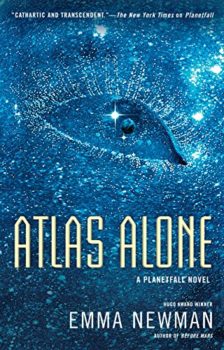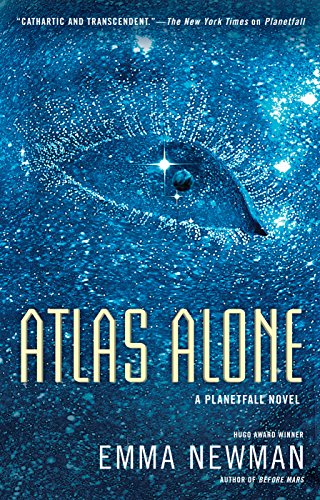
If you enjoy computer games, you may love this novel. I don’t, and I didn’t. Somehow, Emma Newman managed to write a story about space travel that takes place almost exclusively in virtual reality. I’m not even convinced that those scenes purporting to be set in physical reality weren’t imaginary as well.
Estimated reading time: 3 minutes
In this sci-fi novel about virtual reality, nothing is what it seems
In this fourth entry in Emma Newman‘s Planetfall series about humanity’s venture to the stars, we enter the lives of a handful of the more than 10,000 passengers on the starship Atlas Alone. They’re six months into a 20-year journey to a distant planet where they hope to find God. Yes, God. Somehow, a brilliant religious fanatic had invented a light-speed drive in hopes of pioneering a new life in the heavens. She had left Earth with a ship full of 10,000 followers. And the people in charge of Atlas 2 are determined to follow in her footsteps. Or are they?
Atlas Alone (Planetfall #4) by Emma Newman (2019) 317 pages ★★★☆☆
Welcome to Atlas Alone. Someone on the ship has engineered a nuclear war on Earth that has murdered billions and condemned the rest of humanity to die. Dee is determined to find out who gave that order, and why. But even her closest friends, Carl and Travis, refuse to help her. And as a former nonperson, she is barred from access to the records on the ship that might reveal who’s in charge. (Not so incidentally, Dee and her friends had all been indentured workers, or slaves, back on Earth.) Then, suddenly, she gets a big break: an invitation from someone close to the inner circle to take on a job that will give her that access.
Religious fanatics govern the ship
Then a strange new voice surfaces in Dee’s consciousness. She may be asleep, or engaged in a “mersive” game. The voice prods her into a strange, dream-like odyssey in which she is forced to stumble across the dead bodies of everyone she was closed to on Earth. And the dream, if in fact it is a dream, culminates when Dee kills a man who is about to commit mass murder. Although Dee experiences the event as an expression of virtual reality, it turns out that she actually did kill the man in “meatspace.” And that’s only the beginning of her troubles, as she finds herself in conflict with the religious fanatics in charge of the ship. Yet Atlas Alone, after all, is a sci-fi novel about virtual reality. So, who can tell what is real, and what isn’t?
For related reading
Previously, I reviewed all three of the earlier novels in the Planetfall series:
- Planetfall (Planetfall #1)—A promising but disappointing new science fiction novel
- After Atlas (Planetfall, A)—A 22nd century police procedural in a fascinating future Earth
- Before Mars (Planetfall #3)—A psychological thriller in a science fiction setting
For more good reading, check out:
- These novels won both Hugo and Nebula Awards
- The ultimate guide to the all-time best science fiction novels
- 10 top science fiction novels
- The top 10 dystopian novels
- Ten new science fiction authors worth reading now
And you can always find my most popular reviews, and the most recent ones, on the Home Page.



























